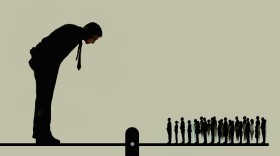
Shankar Vedantam
Shankar Vedantam is the host and creator of Hidden Brain. The Hidden Brain podcast receives more than three million downloads per week. The Hidden Brain radio show is distributed by NPR and featured on nearly 400 public radio stations around the United States.
Vedantam was NPR's social science correspondent between 2011 and 2020, and spent 10 years as a reporter at The Washington Post. From 2007 to 2009, he was also a columnist, and wrote the Department of Human Behavior column for the Post.
Vedantam and Hidden Brain have been recognized with the Edward R Murrow Award, and honors from the American Association for the Advancement of Science, the Society for Personality and Social Psychology, the International Society of Political Psychology, the Society of Professional Journalists, the National Association of Black Journalists, the Austen Riggs Center, the American Psychoanalytic Association, the Webby Awards, the Pennsylvania Associated Press Managing Editors, the South Asian Journalists Association, the Asian American Journalists Association, the Pennsylvania Newspaper Association, the American Public Health Association, the Templeton-Cambridge Fellowship on Science and Religion, and the Rosalynn Carter Mental Health Journalism Fellowship.
In 2009-2010, Vedantam served as a fellow at the Nieman Foundation for Journalism at Harvard University.
Vedantam is the author of the non-fiction book, The Hidden Brain: How our Unconscious Minds Elect Presidents, Control Markets, Wage Wars and Save Our Lives. The book, published in 2010, described how unconscious biases influence people. He is also co-author, with Bill Mesler, of the 2021 book Useful Delusions: The Power and Paradox of the Self-Deceiving Brain.
-
Envy is one of the most unpleasant of all human emotions. This week, we explore an emotion that can inspire us to become better people — or to commit unspeakable acts.
-
This week, we search for the answer to a deceptively simple question: why is the brain divided? Psychiatrist Iain McGilchrist explains why popular distinctions between the "left brain" and "right brain" aren't supported by research. He argues that one hemisphere has come to shape Western society — to our detriment. For more information about this episode, please visit https://n.pr/2SxITco
-
Maya Shankar was well on her way to an extraordinary career as a violinist when an injury closed that door. This week, we revisit our December 2015 conversation with Maya, in which she shares how she found a new path forward after losing an identity she loved.
-
This week on the Hidden Brain radio show, we dig into the culture and psychology that determines the foods that make us salivate and the scents that make us squirm.
-
We're used to the idea that rhetoric sways voters. But what about another element of language: a candidate's voice? This week on Hidden Brain, what happens when our political system and ancient biological rules meet. For more information about the research in this episode, visit https://n.pr/2Pe1Fog.
-
There is one truth that has endured through the first two years of Donald Trump's presidency: he has kept the support of the core voters who propelled him to the White House. This week on Hidden Brain, we explore two competing perspectives on the motivations of Trump supporters, and what they can tell us about the state of our union.
-
When most of us think about how we came to our political views, we often give a straightforward answer. We believe our stances on taxes, immigration or national security are shaped by those around us — our friends, parents, teachers. We assume our life experiences are the root of our political ideologies. But what if there is something deeper in us that drives the music we listen to, the food we eat — even the politicians that we elect? This week, we explore the role of biology in shaping our political identities.
-
Decades ago, a group of women accused a prominent playwright of sexual misconduct. For the most part, the complaints went nowhere. In 2017, more women came forward. This time, people listened.
-
This week on the Hidden Brain radio show, we explore how the constantly evolving nature of languages can give us different ways of understanding ourselves as well as the world we live in.
-
This week on Hidden Brain's radio show, we tackle a big topic: power. From our conflicted feelings toward the powerful, to the ways we gain and lose power ourselves, and how power can corrupt.










